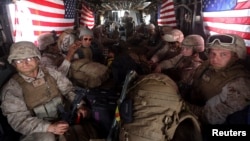Surveys find that men in U.S. special operations forces do not believe women can meet the physical and mental demands of their commando jobs, and they fear the Pentagon will lower standards to integrate women into their elite units, according to interviews and documents obtained by The Associated Press.
Studies that surveyed personnel found "major misconceptions'' within special operations about whether women should be brought into the male-only jobs. They also revealed concerns that department leaders would" capitulate to political pressure, allowing erosion of training standards,'' according to one document.
Some of those concerns were not limited to men, researchers found, but also were found among women in special operations jobs.
Dan Bland, force management director for U.S. Special Operations Command, told the AP that the survey results have "already driven us to do some different things in terms of educating the force.''
About 68,800 people serve in the command, including 3,000 civilians. The main survey went to about 18,000 people who are in positions closed to women, and the response was about 50 percent. The high response rate, officials said, reflects the wide interest in the subject.
The studies are part of the Pentagon's effort to open all military combat positions to women or provide reasons why any jobs should remain closed.
One survey, by RAND Corp., reflected doubts that women could meet the overall job demands, found concerns that sexual harassment or assault could increase, and cited worries about "unequal treatment'' of special operations candidates and personnel. Some worried that if women were let in to some jobs, they might be treated more harshly.
Survey details have not been released. This was the first time that officials from Special Operations Command publicly discussed the results.
Andy Hamilton, who works with Bland and has expertise on this issue, noted that women in special operations jobs had concerns, too, about the broader integration.
"They're concerned that this might result in the lowering of the standards in what are currently our male-only occupations, and that would then reflect on either them or on the women who come into those occupations,'' said Hamilton.
Pentagon leaders lifted the ban on women in combat jobs in 2012, but gave the military services time to integrate women gradually and systematically into the male-only front-line positions. By January 2016, the military must open all combat jobs to women or explain why any exceptions must be made.
Positions within the special operations forces, including the clandestine Navy SEAL and Army Delta units, are considered the most grueling and difficult jobs in the military, with training and qualifying courses that push troops to their physical, mental and emotional limits. The commandos often work in small teams in harsh, remote locations.
As a result, those jobs are some of the last to be addressed as commanders review the qualifications needed and assess the impact of bringing in women.
As integration unfolds, the surveys have brought home the reality that there are "some reservations or misperceptions in the force in terms of why we're doing this,'' Bland said. Defense officials have stressed that they will not reduce standards in order to let in women.
Women have so far had mixed results as they try to move into the more demanding combat positions - jobs for which men also have difficulty qualifying.
So far, about 7,200 positions within the special operations forces have been opened to women, including combat jobs in the 160th Special Operations Aviation Regiment, a specialized unit used to fly forces fast, low and deep behind enemy lines at night. For the first time, a woman last year made it through training and began serving as a pilot in the unit. Three female pilots, 25 women in other jobs, and 16 other women are now going through initial training for these helicopter crews, known as Night Stalkers.
Most female soldiers do not want combat jobs, an earlier survey found. But among those who do, the Night Stalkers were a popular choice.
Women have moved into Army artillery jobs and serve on Navy submarines and in the naval Riverine units. But none has made it through the Marine Corps' officer infantry course.
Special operations command leaders have made it clear that genuine concerns exist about incorporating women into some jobs.
In 2013, when the planning was in its infancy, then-Maj. Gen. Bennet Sacolick spoke of the demanding nature of missions requiring forces ``to operate in small, self-contained teams, many of which are in austere, geographically isolated, politically sensitive environments for extended periods of time.''
In an email last month to members of the special operations forces across the services, Gen. Joseph Votel, head of U.S. Special Operations Command, said leaders had done initial analysis on training, facilities, education and other policies. Now, officials are examining "the social and cultural challenges of integrating females'' into male-only jobs.
Next, Votel said, officials will analyze requirements for the jobs to make sure standards are accurate and gender neutral.
"We will continue in our commitment to provide the best manned, trained, and equipped special operations personnel to execute our nation's most difficult and sensitive missions,'' Votel said. "With that in mind, we can assure you that our high standards will not be lowered.''
Bland said that in addition to Votel's email to service members, leaders have discussed the issue with commanders at frequent meetings so they can better educate their troops.
US Special Ops Forces Skeptical Women Can Do Their Job

WASHINGTON —



